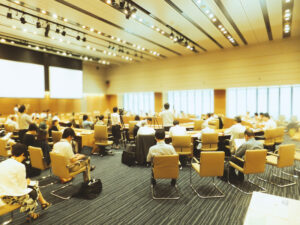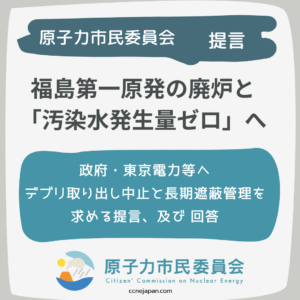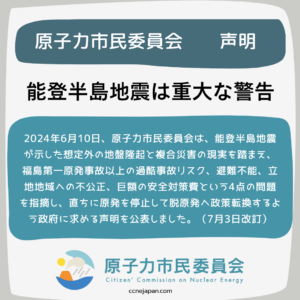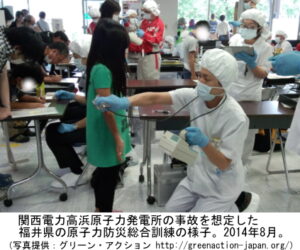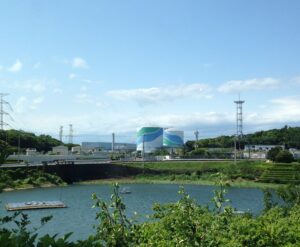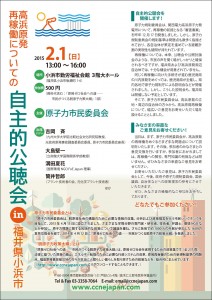![]()
|
2023年4月に開催予定のG7気候・エネルギー・環境相会合で、議長国日本がとりまとめる共同声明のなかに、東京電力福島第一原発の「処理水」問題について「放出に向けた透明性のあるプロセスを歓迎する」、除染作業によって発生した除去土壌を再利用する計画の「進捗(しんちょく)を歓迎する」とする表現を盛り込もうと、日本国政府が各国と調整しているとの報道に接し、原子力市民委員会は3月29日、G7各国に下記のレター 和訳はこちらから |
CCNE, an independent, non-profit think-tank that has been investigating the damages caused by the Fukushima nuclear accident, is sending this letter because we have an urgent matter to address to your government. We have learned from media reports media reports that the Japanese Government is coordinating with other G7 countries to include in the Communiqué of the G7 Ministers’ Meeting on Climate, Energy and Environment in Sapporo, April 2023, a statement that “welcomes the transparent process toward the release” of “treated water” from the Tokyo Electric Power Company (TEPCO)’s Fukushima Daiichi Nuclear Power Plant and also “welcomes the progress” of the plan to utilize soil removed by clean-up works in the areas contaminated by the nuclear accident. We firmly request the honorable ministers to refrain from making any such endorsement for the reasons stated below.
In Japan, citizens including those working for agricultural and fisheries industries in Fukushima, have been critical of the release of “treated water” and utilization of removed soil because both of them still contain residual radionuclides. However, the Japanese Government’s decision-making process has been quite undemocratic and unilateral, without interactive discussion nor sufficient disclosure or explanation, both to the Japanese public and to the affected neighboring countries and their citizens.
Japanese civil society including CCNE has repeatedly pointed out many unresolved problems with the discharge of “treated” contaminated water and the utilization of removed soil and has actively proposed viable alternatives to store contaminated water and soil without dispersing them (you can find CCNE’s related statements in English here). The Japanese Government has failed to address these concerns and has not seriously taken the proposed alternatives into consideration. It must be stressed that there has been very little transparency in the decision-making process, and it is hard to find any reason for the G7 countries to endorse the progress which lacks democratic legitimacy.
The current plan by the Japanese Government is to continue releasing tritium for more than 30 years at 10 times the amount that was released prior to the Fukushima accident. The Japanese Government and TEPCO are responsible for the massive amount of radioactive release into the environment and the continuing spill since 2011. It would be unacceptable if the polluter re-contaminate the ocean, which is a priceless transnational environmental asset, by additional and intentional discharge of the radioactive materials without pursuing alternative measures to keep them in storage. Moreover, the standard for radioactive waste in Japan was loosened 80 times after the accident. Since this relaxed regulation has also been adopted for the utilization of removed soil, many citizens are concerned about the spread of contamination through the promoted “reuse” of the soil.
The Japanese Government is trying to justify these measures on the basis of approval and support from the International Atomic Energy Agency (IAEA) and other international organizations. This does not respond to the above concerns and cannot justify the disregard for domestic democratic decision-making procedures.
For the reasons stated above, CCNE expresses its grave concern over any misleading reference to these controversial matters in the forthcoming Communiqué of the G7 Climate, Energy and Environment Ministers’ Meeting. We sincerely request your Government to consider the concerns of the Japanese civil society and to refrain from endorsing the proposed handlings of radioactive waste of Fukushima by the Japanese Government which is still under public and parliamentary debate.
● Citizens’ Commission on Nuclear Energy (CCNE, eng.ccnejapan.com) is an independent research and advocacy body, established after the Fukushima disaster in order to draw out a comprehensive, ethical and viable policy to achieve nuclear power phaseout and solve related issues in Japan. The Commission is administered by the Takagi Fund for Citizen Science, Tokyo (an authorized charity corporation). CCNE currently consists of a board of 7 commissioners, three Working Groups (commissioners plus additional members), an advisory panel of experts and a secretariat. It has more than 80 members with a wide range of expertise such as social sciences, ethics, law, technologies (including nuclear engineering), environmental and medical sciences; the members also include a number of residents directly affected by the Fukushima nuclear accident 2011 and on.

